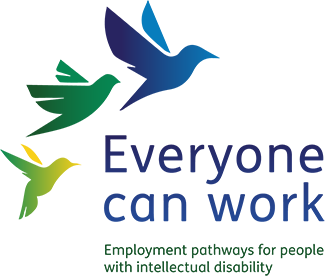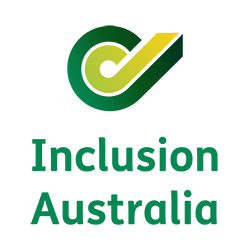Lizzie:
My name is Lizzie and I’m 14. And this is Lisa and she is 20. Our business is called L&E Designs, and we’re the co-owners.
Tania Harris:
So do you like working in business? Yes or no. You do? Ooh, she does.
Lizzie:
We’ve been running it for about 11 months. And we sell more fashion-forward clothes protectors, for people who maybe have a disability.
Tania Harris:
My name’s Tanya Harris and I’m Lisa and Lizzie’s mum. Lisa is very determined. She’s very sweet, but she likes things her way. She’s very verbal, doesn’t use spoken language and really tough. She looks pretty fragile but she’s definitely not.
Ben:
My name is Ben and I’m 35 years old. I work at the Council for Intellectual Disability or we call it CID for short. I’m a project worker. I help my work colleagues with co-designing. It’s very exciting.
Speaker 4:
Lisa knows.
Tania Harris:
Lisa went to an ed support school from kindie. So, when she was three to when she was like 18, her whole sort of school life. The options that were presented to us before Lisa finished school, so prior to the NDIS, where day centers and groups, a couple of times a week or something. The assumption was that she wouldn’t work. The idea of going of Lisa going into a day program a couple of days a week didn’t make me very happy. It didn’t seem like it would be particularly interesting or fulfilling or stimulating or…
Ben:
I did work experience at a local Woolworth’s. That was when I was in Year 10. And then when I was in Year 12, I did work experience at a cafe. I was lucky enough to get a job basically out of high school. In the family business, my dad owned and ran a bookshop. One of the biggest skills that I learned was using a computer register and that really helped me working at CID.
Tania Harris:
Lisa finished school a year and a half before the NDIS came in. Prior to the NDIS there wasn’t a lot of choices but we started planning pretty quickly, once the NDIS came to our area. We knew that micro enterprises were something that could be included in the NDIS plan. We weren’t really sure how that worked.
Lizzie:
First what we did was contact Valued Lives, which works with people with disabilities who want to start their own businesses. The first step was doing the business plan and finding out how to get an ABN, and things like sewing, marketing, taking good pictures. The role that Lisa plays is mainly picking out which fabric she likes and which patterns and what she wants to post and she also models most of the things, as you can see.
Ben:
My coordinator that helped with the NDIS, asked me if she wanted to go online and find jobs for me. And I said, “Yeah, that’s fine.” And then she came back to me and told me about this job. She helped me apply for the job at CID and as they say, the rest is history. I’ve been at CID now for three years.
Tania Harris:
I’ve seen lots of benefits for Lisa in that she has to attend meetings, has I think worked out that she’s got to contribute as well, which has been good for patience. And also getting out, selling stuff at markets and being at markets has been beneficial. She’s getting better and better at making her own decisions. And I think as time has gone on, the support that I provide is probably less.
Lizzie:
I think people with disabilities would really want a way to support themselves. I think what Lisa loves most about the business is getting to work with her family, having a lot of more money and more freedom in that sense. And also just being able to do something day by day.
Ben:
I like earning money than getting money handed to me. And before I got the job at CID, I was only working one day a week and I thought, “Well, I’m not enjoying getting more from the DSP then from working.” And that’s why I’m glad now that I’m earning more money from working, than I’m getting from the DSP.
Tania Harris:
I think to parents that are feeling overwhelmed as their kids are getting to adulthood, is really to try to connect to other parents that have been through it. To find a good support network and you can take your time and see what fits and you can try different things. It’s not going to be right the first time and it doesn’t matter, that’s okay. I think be really creative as well. There’s so many options out there now and really finding out what your kid wants to do, or giving them options because sometimes you might not know and they might not be able to tell you. And I think it’s through meeting other people and seeing what other people are doing that work looks different for different people. Understanding the role of support workers and what they can play, that they’re not just there to do personal care but they’re there to actually support you in your life and in what you want to do. So helping you do things that you can’t do.
Ben:
My advice to young people, find something they are passionate about and write down little steps and eventually build up to working in the job they may want to do. I know that when I got the job at CID, a lot of my family were really supportive. They’d keep on encouraging me to keep on going. If your son or daughter gets a job, to be supportive and encourage them to continue to work hard.
Tania Harris:
My priorities for Lisa, as she grows into the young adulthood, to keep her living a life that’s really interesting, and that does have the same opportunities that my other kids are having. Failing sometimes and succeeding at other times it’s kind of, I just want her to be able to have all of those things.


